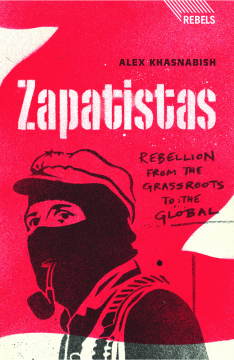
Additional Information
Book Details
Abstract
In the early hours of January 1, 1994 a guerrilla army of indigenous Mayan peasants emerged from the highlands and jungle in the far southeast of Mexico and declared "¡Ya basta!" - "Enough!" - to 500 years of colonialism, racism, exploitation, oppression, and genocide. As elites in Canada, the United States, and Mexico celebrated the coming into force of the North American Free Trade Agreement the Zapatista Army of National Liberation (Ejército Zapatista de Liberación Nacional, EZLN) declared war against this 500 year old trajectory toward oblivion, one that they said was most recently reincarnated in the form of neoliberal capitalist globalization that NAFTA represented.
While the Zapatista uprising would have a profound impact upon the socio-political fabric of Chiapas its effects would be felt far beyond the borders of Mexico. At a moment when state-sponsored socialism had all but vanished from the global political landscape and other familiar elements of the left appeared utterly demoralized and defeated in the face of neoliberal capitalism's global ascendance, the Zapatista uprising would spark an unexpected and powerful new wave of radical socio-political action transnationally.
Through an exploration of the Zapatista movement's origins, history, structure, aims, political philosophy and practice, and future directions this book provides a critical, comprehensive, and accessible overview of one of the most important rebel groups in recent history.
Alex Khasnabish is an Assistant Professor in the Department of Sociology and Anthropology at Mount Saint Vincent University in Halifax, Nova Scotia. His first book Zapatismo Beyond Borders: New Imaginations of Political Possibility (2008), focuses on the reasons for and consequences of the transnational resonance of Zapatismo and the links between radical political imaginations and global anti-capitalism. His work has been published in AmeriQuests, Anthropologica, Critique of Anthropology, the Globalization and Autonomy Working Paper Series, Journal for the Study of Radicalism, Politics and Culture, and Upping the Anti.
'Khasnabish's text provides our best lens yet on the twenty-first century's most intriguing revolutionaries.'
Eric Selbin, Southwestern University
'The clearest, most comprehensive account to date of the Zapatista movement. This is a must-read for students, scholars, activists, and anyone who believes another world is truly possible.'
Jeffrey S. Juris, Arizona State University
'This book is a unique testament to the political creativity of the Zapatista movement that has inspired activists and scholars since the 1990s.'
Thomas Olesen, author of International Zapatismo
'It is old-time movement-based theory at its best.'
Richard Day, Queen's University
Table of Contents
| Section Title | Page | Action | Price |
|---|---|---|---|
| About the series | i | ||
| Acknowledgements | vii | ||
| Introduction | 1 | ||
| Rebel dignity | 3 | ||
| Twelve days in January | 5 | ||
| Masks and Marcos | 11 | ||
| 1| The origins of Zapatismo | 21 | ||
| A struggle for independence – by whom and for whom? | 22 | ||
| The double-edged sword of modernization | 27 | ||
| Revolution on the horizon | 29 | ||
| Land and liberty: Zapata and the Mexican Revolution | 32 | ||
| ‘Institutionalizing’ a revolution | 42 | ||
| Fractures | 48 | ||
| The seeds of rebellion in Chiapas | 54 | ||
| Enough! | 59 | ||
| 2 | Zapatismo as political philosophy and political practice | 62 | ||
| Fire and word | 63 | ||
| Rebel roots | 65 | ||
| ‘A revolution to make a revolution possible’: Zapatismo and women’s rights | 74 | ||
| To change the world without taking power | 81 | ||
| The challenge of Zapatismo: revolutionary action beyond insurgency | 85 | ||
| The politics of ‘no’ | 92 | ||
| 3 | The national impact of Zapatismo | 96 | ||
| Zapatismo and rebel Mexico | 97 | ||
| 'From the mountains of the Mexican southeast’: Zapatismo’s politics of the word and the deed | 107 | ||
| ‘Today we say enough is enough!’ The Zapatistas declare war | 109 | ||
| ‘Our sovereignty resides in civil society’: The Second Declaration of the Lacandón Jungle | 114 | ||
| ‘Our struggle is national’: The Third Declaration of the Lacandón Jungle | 120 | ||
| ‘The Zapatista Front of National Liberation’: The Fourth Declaration of the Lacandón Jungle | 125 | ||
| ‘This is the hour of national civil society’: The Fifth Declaration of the Lacandón Jungle | 143 | ||
| The Sixth Declaration of the Lacandón Jungle and the Other Campaign | 148 | ||
| An other Mexico | 162 | ||
| 4 | The transnational impact of Zapatismo | 164 | ||
| From the local to the transnational: Zapatismo beyond borders | 164 | ||
| Rebels and the Fourth World War | 169 | ||
| An international order of hope: transnational encounters with Zapatismo | 177 | ||
| Speaking a new language of struggle and possibility | 192 | ||
| Three shoulders | 196 | ||
| Conclusion | 199 | ||
| References | 205 | ||
| Index | 215 |
